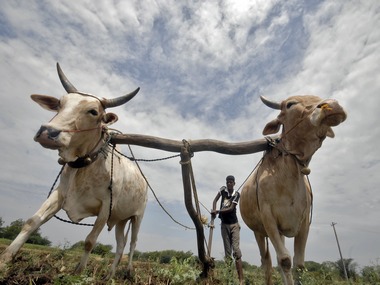The BJP is under attack, yet again. But this time it is not from the Left or other Opposition parties, but from within its own mould – the Bharatiya Kisan Sangh (BKS), a farmers’ representative organisation affiliated with the Rashtriya Swayamsevak Sangh (RSS), has raised a red flag against the Centre’s nod to 100 percent foreign direct investment (FDI) in food processing and animal husbandry sectors, besides others. The government’s decision to allow 100 percent FDI in trading of food products – including through e-commerce to boost food processing sector in India through government-approved routes – has not gone down well with the right-wing farmers’ union. [caption id=“attachment_2396674” align=“alignleft” width=“380”]  Representaional Image. Reuters[/caption] Expressing serious concerns over the issue, the BKS has shot a letter to the Prime Minister’s Office (PMO) stating that the move would prove damaging for the rural economy. “Hundred percent FDI in food processing sector will have a damaging impact on micro industries in the rural sector. There’s a large-scale employment in villages who are engaged in tiny processing industries, and they are manual workers. With the entry of large foreign companies, these people will lose their jobs," Badri Narayan Choudhary, national general secretary, BKS, told Firstpost. “These small entrepreneurs will become workers in large factories. We welcome government’s move in technology and defence sectors, but why in animal husbandry? Does the government want multi-national companies to do fishing instead of local fishermen? We’ve communicated our objections to the PMO,” Choudhary said. One hundred percent FDI in food will happen only through the approval route, but is potentially a game-changing idea . It could interest the Wal-Marts to enter into domestic sourcing of food items and help the farmer obtain a better price. But the BKS argue that it could have a cascading effect on the rural economy. “In the Union Budget, the government made allocations to boost traditional farming but nothing worth mentioning has happened at this front because the onus is on state governments. So, it depends on the will and policy of state governments whether to encourage traditional farming or not. The pesticides banned abroad are being used in India, as if our country is a dumping ground. Similarly, FDI in food processing and animal husbandry will have a cascading effect on rural economy and employment,” Choudhary added. It’s not the first time that the Kisan Sangh has opposed an initiative of the NDA government. In 2015, RSS-affiliated bodies like Bharatiya Mazdoor Sangh (BMS) and Swadeshi Jagran Manch (SWJ), along with the BKS had strongly opposed the Centre’s amended version of the Land Bill. They were on a common platform with the Left-affiliated unions on the land bill issue. Bharatiya Kisan Sangh’s apprehensions on 100 percent FDI in food processing: - There will be no growth in employment. In fact unemployment will go up. - Due to FDI, the revenue outflow will be more and the MNCs will invest very little for the growth of local markets. - The NDA opposed this move of the UPA government, when it was in the Opposition, but now doing the same. - Exploitation of farmers, fishermen, people involved in animal husbandry will increase. - Local entrepreneurship will decline. Prabhakar Kelkar, senior RSS functionary and all-India vice president of BKS, said, “Along with the BJP, we too had opposed this FDI move strongly during the UPA regime. It’s really surprising that today the same NDA in power has allowed 100 percent FDI. Let’s not forget that 25 years ago, the MNCs had asked Punjab farmers to grow potato in large quantities for making potato chips, but the farmers had to face a huge loss as the produce wasn’t bought by the companies as promised,” “History will be repeated in this case too. We’ll have a meeting with SJM and BMS on this issue soon and an action blueprint will be chalked out. This decision of the Centre will virtually finish off rural India and our indigenous cottage industry. Government should ensure that small processing units up to Rs one crore should be tied up with MNCs, so that their products can be used,” Kelkar said Following the announcement of the Centre’s decision, Food Processing Minister Harsimrat Kaur Badal had said that the FDI in the food processing sector could cross USD 1 billion in the next two years – helped by reforms in the FDI space and the streamlining of regulations by food safety regulator FSSAI. The food processing sector attracted USD 5,285.66 million FDI in the period between April 2012 and December 2015. However, Sompal, former union minister for agriculture in the Atal Bihari Vajpayee government, and an agriculture expert, differed: “I don’t agree with this argument. The rural markets are facing contraction due to temporal glut during harvest as farmers fail to sell their produce. There is also regional glut due to fluctuation in market prices of produce, as there lacks proper storage facility,” “Indian farmers are unable to access export market. The reason is that the raw produce needs to be processed prior to export, but due to low capacity of the cold chain, it’s not possible. FDI will help in the expansion of market,” Sompal said, who was also the chairperson of the first National Agriculture Commission. “Even during the Vajpayee government, when FDI was proposed, the then senior Cabinet ministers and BJP leaders opposed the move. This is unwarranted,” Sompal added.
BKS has raised a red flag against the Centre’s nod to 100 percent foreign direct investment (FDI) in food processing and animal husbandry.
Advertisement
End of Article


)

)
)
)
)
)
)
)
)



